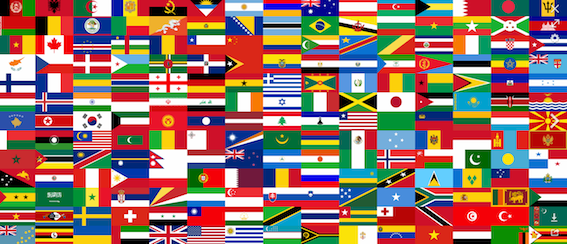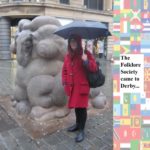Folklore and the Nation: The Annual Conference of The Folklore Society
- Friday 29 to Sunday 31 March 2019
- University of Derby, 1 Friar Gate Square, Derby, DE1 1DZ, UK

Wikimedia Commons
Folklore and the Nation
The annual conference of The Folklore Society, and Annual General Meeting, hosted by the University of Derby, 1 Friar Gate Square, Derby DE1 1DZ, UK
Friday 29–Sunday 31 March 2019
Keynote speaker: Prof. Terry Gunnell (University of Iceland): “Grimm Ripples: The Role of the Grimms’ Deutsche Sagen in the Collection and Creation of National Folk Narratives in Northern Europe”
The nation surges with new found rhetorical power. The last 25 years have seen parliamentary devolution, the Scottish independence referendum and the proposed withdrawal from the European Union, all within the UK alone. Yet this is a global drive, manifesting also in diaspora (St Patrick’s Day is now a global celebration) and the everyday, local acts that constitute our reality. In England, for example, it is no longer remarkable to see the St George’s Cross flying outside suburban houses. We are living through a popular move towards national ideologies.
This conference asks how, why and when folklore has been deployed in the context of national ideologies and ideas of nationhood. For some, the lore of the nation has been an instrument to build consensus; for others, a means of excluding. Signs of cultural identity have served to both unite and divide separate polities, whilst diasporas live within two nations at once, the state of residence and the (sometimes imagined) homeland. The conference accommodates the use of folklore in exclusionary and disciplinary deployments of nationalism, whilst remaining open to flexible definitions of nationalism, in the form of solidarity, ethnicity, diaspora and nations within nations.
Of course, folklore has always been connected with the discourse and development of the nation, as demonstrated by collections such as Timothy Baycroft and David Hopkin’s (2012) Folklore and Nationalism in Europe During the Long Nineteenth Century. Whilst the folk were considered cultural survivals, of low status in the ranks of civilization, folklore was symbolically important to many national struggles. Ambiguous feelings about tradition—whether it was the authentic voice of the people or a quaint echo of the primitive—drove the historical development of nationalism just as it contributed to the development of the academic discipline of Folklore. Custom, legend and tradition played their part in progressive, Romantic nationalism, as much as they did in promoting the nationalism of totalitarian states. What, then, is traditional about the place of folklore in nationalism, and nationalism in folklore?
This conference will include perspectives from Anthropology, Cultural Studies, Ethnology, Ethnomusicology, History, Literary Studies, Sociology and other disciplines. Many of the following themes will be explored: Literary and artistic uses of folklore in relation to national ideologies; Relations between ethnicity, nationalism and folklore; Folk heroes; The use of folklore against the nation; The heritage industry and its relationship to nationalism and folklore; The mobilisation and reception of folkloric motifs, items and folkloristics itself, by extremists, both historical and contemporary; Disciplinary questions of resistance. How can, or should we, as folklorists, respond to its uses in such contexts? Vernacular ideologies of myth and narrative in national popular culture; The relationship between nationalism, folklore and media, including the role of the internet and social media; The relationship between folklore, Gramscian ‘common sense’ and hierarchies of knowledge in relation to nationalism; Folklore and Brexit; Folklore, asylum and immigration; The relationship of folkloristics to nationalism and the nation.
The conference is kindly hosted by the University of Derby at its One Friar Gate Square campus in the centre of the city. There will be a tour of Derby and opportunity to visit the Peak District.
The conference will begin at 2:00 pm on Friday 29th March (registration open from 1:00 pm), and will end at lunchtime on Sunday 31st.
Conference fees: Concessions: £100 (Speakers, Folklore Society members, students, seniors, staff of the University of Derby).
Standard rate: £150.
Conference fee includes lunches on Saturday and Sunday.
Single Day rates available.
Download the booking form here: Booking Form 2019.docx
Accommodation is not provided, but a list of hotels can be supplied on request from thefolkloresociety@gmail.com
Parking: blue badge only
The Folklore Society’s Annual General Meeting 2019 will be held during the conference, on Saturday 30 March, from 12:45–13:30. All FLS members are encouraged to attend, and all conference participants who are not yet members are encouraged to join. Please let us know that you will be attending: email thefolkloresociety@gmail.com
Download the Programme and Abstracts here
Programme:
Friday 29 March 2019
13.00 Registration in Room FG301
14.00 A: Welcome from Prof. Keith McClay of the University of Derby
— The Folklore Society Presidential Address, by Prof. Patricia Lysaght: Folklife and the Nation: An Artist in the Field for the Irish Folklore Commission in the 1940s and 1950s
15.00 B: Peoples, Nations and Regions
— Prof. Diarmuid Ó Giolláin: Plebs, Populus and Nation in Folklore Studies
— Prof. David Hopkin: The Region: Folklore’s Dominant Unit of Analysis
— Dr Will Pooley: Witchcraft-Crimes and the Problem of Methodological Nationalism: France, 1790-1940
16.30 Tea/coffee
16:55: C: Regional-National Identity: A special panel. All three speakers are founder members of the Centre for Contemporary Legend (CCL) research group at Sheffield Hallam University.
— Andrew Robinson: Photographic Surveys of Calendar Customs: Preserving Identity in Times of Change
— Diane A Rodgers: Et in Arcadia ego: British Folk Horror Film and Television
— Dr David Clarke: The Last Earl of Hallamshire: Legend, Landscape and Identity in South Yorkshire
18:25 End of first day: Conference delegates are then invited to the Maypole Inn, 42 Brook St, Derby DE1 3PH, for a wine reception, followed by the opportunity to order food. At 20.30 there will be a performance by Shonaleigh Cumbers, introduced by Dr Simon Heywood.
Saturday 30 March 2019
09.15-10.45 Panels D1 and D2
Panel D1: Materials and Symbols
— Dr Daria Radchenko: “Cook me some Rusiano”: Economic Sanctions, Newslore and Marketing in Russia
— Dr Tetiana Volkovicher: How Ukrainians Made a Russian Boy with Balalaika Play Bandura
— Roy Vickery: Shamrock, Rose, Thistle, and Daffodil (or should it be Leek?) – Plants as National Symbols
Panel D2: Collectors
— Elena Sottilotta: A ‘Novello Folklorista’ in Post-Unification Italy: Grazia Deledda’s Folkloric Writings Between Insular and National Identity
— Sofia Lago: ‘Death to Every Story’: Nineteenth-Century Folklorists and the Appropriation of Folk Culture in Northern Europe
— Dr Camilla Schroeder: Building a Nation: The Brothers Grimm and Germany
10.45 Tea/coffee
11.15 -12.15 E: Keynote Address:
— Prof. Terry Gunnell: Grimm Ripples: The Role of the Grimms’ Deutsche Sagen in the Collection and Creation of National Folk Narratives in Northern Europe
12.15-13.30 Lunch
12.45-13.30 Annual General Meeting of The Folklore Society: all members are urged to attend, and all conference participants are encouraged to join the society
13:30-15.00 Panels F1 and F2
Panel F1: Morris, Country Dance and Stories
— Derek Schofield: Visions of English Identity: The Country Dance and Shakespeare-land
— Matt Simons: Embodied Englishness in the Interwar Morris Revival
— Keith Shipton: Worldliness and Enchantment in Kipling’s ‘Puck’ Stories
Panel F2: Myths and Praxis
— Dr Andrew Fergus Wilson: The Mythic Ethnostate in the Neofascist Imaginary
— Benjamin Richards: The Stable Ground of Nothingness: Bataille, Myth and the Ghosts of Fascism
— Simon Poole: The Federal Writers’ Project, Nationalism and the Personal Experience Story
15.00 Tea/Coffee
15.25-16.55 Panels G1 and G2
Panel G1: England
— Robert McDowall: English Folklore: What Values Does it Represent?
— Ellada Titane: A Home without a Heart? Folklore and Negotiating Identity Countries:
— Jeremy Harte: Remember Athelstan! The Afterlife of an Anglo-Saxon King
Panel G2: Religion
— Prof. James H Grayson: Building the Nation: Conflicting Myths, Conflicting Nationalisms
— Rosemary Power: The Nation Grieving: The Death of Diana in Derbyshire [to be read by Matt Cheeseman]
— Donatella Lanzarotta: According to Matthew: The Symbolic Evolution of the ‘Lega’, from its Pseudo-Celtic Origins to the Allegedly Christian Present
16.55 End of second day: Forage for food and meet up at the pub
Sunday 31 March 2019
09.30-11.00 Panel H: Writers and Scouts
— Silvia Storti: An Empire Apart: Anne Thackeray’s Fairy Tales and the Decline of the British Empire
— Dr Carina Hart: Contemporary British Masculinity as Gothic Fairy Tale in Ali Shaw’s The Trees.
— Dr Cath Bannister: Scouting for St George: Re-Imagining St George’s Day as a Relevant, Inclusive Celebration for Scouts in England.
11.00 Tea/Coffee
11:30–13.00 Panels I1 and I2
Panel I1:
Contemporary Folklore
— Dr Tina Paphitis: Nasjonalretter: Food and Foodways in Representing Nordic Nations.
— Mimi McGann: The Good Mark: Claiming Space in Folklore and Brexit
— Tabitha Peterken: Bloody Europe
Panel I2: Celtic Nationalism
— Felix Taylor: The Pyramid of Fire: Arthur Machen, the Tylwyth Teg, and Celtic Nationalism in the 1890s.
— Ciarán Walsh: Leaving the Union: Haddon, Home Rule and Anti-Imperialist Agendas in Anglo-Irish Folklore
— Dr Katie Meheux: A Scottish Volk? Anthropology, Folklore, Race and Nationalism in Inter-War Scotland
13.00 Lunch
14:00 Excursion led by Dr Simon Heywood
16:00 Conference closes
Photos: Jeremy Harte





